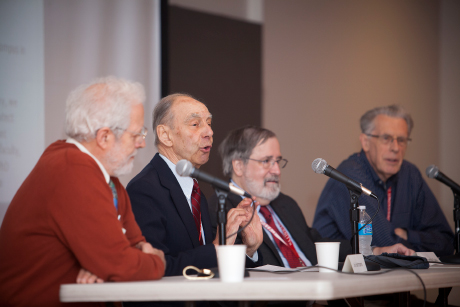Computer science times are a-changing
By Bill Steele

When computer science first emerged at Cornell it was an innovation, off the beaten path, but there are still new things to come, according to a panel of CS veterans assembled for the 50th anniversary of the department.
A two-day symposium for the golden anniversary of the Department of Computer Science opened with a panel of Turing laureates – three scholars who have received the Association for Computing Machinery’s A.M. Turing Award, considered the equivalent of a Nobel Prize in computer science, all of whom had a connection with Cornell, either as students or faculty members.
Edmund M. Clarke, Ph.D. ’76, the FORE Systems University Professor of Computer Science at Carnegie Mellon University, said he had been “drawn to Cornell by the subject matter,” back when Cornell had one of the first computer science departments – then occupying just one floor in Upson Hall.
It was new to everyone. John Hopcroft, Cornell’s IBM Professor of Engineering and Applied Mathematics in Computer Science, thought that being a graduate student in the department made him “one of the world’s first computer scientists.”
“Nobody at Cornell seemed excited that we were doing this,” said Juris Hartmanis, the Walter R. Read Professor of Computer Science and Engineering Emeritus at Cornell and the founding chair of the department. It was Cornell’s freedom that made it possible, he said.
The panelists went on to discuss the early growth, with problems obtaining financing and hiring new faculty. At first, Hopcroft said, the goal was “making computers useful,” so research focused on programming languages. But Cornell rapidly became a center for theoretical computer science, seeking to understand how computers work, not just what you can do with them.
Applications are still important: Many computer science faculty members have joint appointments in other disciplines, and about half of all students graduating from Cornell have taken at least one computer science course.
But now, perhaps because of this ubiquity, “Computer science is undergoing a fundamental change,” Hopcroft said. “Our department may have a leadership role in these changes.”
Media Contact
Get Cornell news delivered right to your inbox.
Subscribe